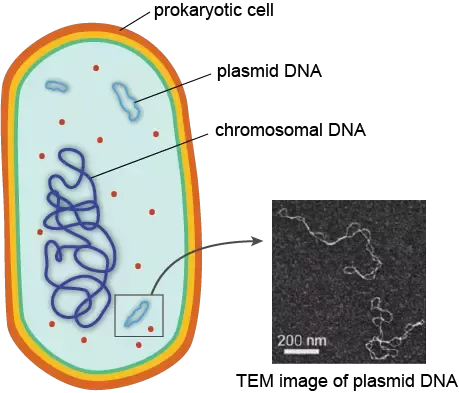Plasmid is a small circle DNA,typically found in bacteria,that is separate from the majority of bacterial DNA located in the nucleoid. Specifically,plasmids are nonessential extra chromosomal pieces of DNA which usually contains between 5 and 100 genes that are not required for the survival of the bacteria.
Plasmid is actually a vehicle for storing and studying genes.Scientists use it in laboratory experiments as a vector for DNA of interest,typically a gene, they are usually represented by a simple circle inside a cell.
To be an effective tool for scientists, a plasmid typically possesses three basics feature or importance:
- A multiple cloning site.
- An origin of replication,and
- A selectable marker.
Now let’s see how these plasmid features plays a key role in genetically engineering bacteria to produce human insulin. If the main purpose of a plasmid is to serve as a vehicle for genes of interest,we need to be able to insert the human insulin gene into the plasmid. This is the purpose of Multiple Cloning Site.A Multiple Cloning Site is the location in a plasmid where a sequence of DNA,typically a gene, can be inserted. Once a gene is inserted into a plasmid, you obviously don’t want to lose it. Wouldn't it be great if the bacteria did all the work maintaining the plasmid for us ? Actually,that’s one main reasons scientists put a gene into a bacterial plasmid. The origin of replication is the place where the process of DNA replication begins. Therefore, if our plasmid possesses an origin of replication (ori.) the bacteria will automatically make a new copy of the plasmid during the replication process (DNA replication creates an exact copy of DNA in the cell). This means that the two daughter cells both receive a copy of the DNA found in the mother cell when the mother cell divides. If our genetically engineered plasmid has an origin of replication, it is also replicated creating a two daughter cells both containing the gene of interest (GOI). A plasmid also possess a selectable marker, selectable marker is an element that is required for the maintenance of the plasmid in the cell. Due to the presence of the selective marker, the plasmid becomes useful for the cell. Under the selective conditions, only cells that contain plasmids with the appropriate selectable marker can survive. Commonly, genes that confer resistance to various antibiotics are used as selective markers in cloning vectors.


No comments:
Post a Comment